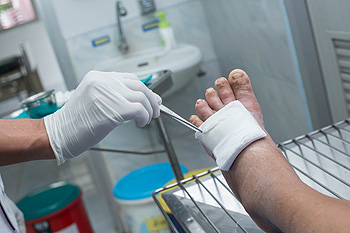
For many diabetics, regular foot care can become a new part of their life, specifically to battle neuropathy or peripheral artery disease. The poor circulation and nerve damage related to the disease can make it more difficult to detect injuries or sores on the feet and toes. As a result, open sores can become ulcerated because the healing process is slowed, and infections can set in more easily. Serious infections, if left untreated, can develop into gangrene and in extreme cases, lead to amputation. The first line of defense against foot ulcers is proper shoes, which can help to protect your feet from harm. Experts advise diabetics to avoid wearing high heels, sandals, stiff shoes, and flip-flops. They suggest wearing socks to prevent blisters and choosing shoes with ample toe room, a smooth inner lining, and a thick heel. It is also suggested that you examine your feet daily for sores, unusual coloration, or other abnormalities. If you are diabetic and have noticed problems with your feet, it is a good idea to make regular visits to a podiatrist for examination and treatment.
Diabetic foot care is important in preventing foot ailments such as ulcers. If you are suffering from diabetes or have any other concerns about your feet, contact Tanisha Richmond, DPM from Richmond Foot & Ankle, LLC. Our doctor can provide the care you need to keep you pain-free and on your feet.
Diabetic Foot Care
Diabetes affects millions of people every year. The condition can damage blood vessels in many parts of the body, especially the feet. Because of this, taking care of your feet is essential if you have diabetes, and having a podiatrist help monitor your foot health is highly recommended.
The Importance of Caring for Your Feet
- Routinely inspect your feet for bruises or sores.
- Wear socks that fit your feet comfortably.
- Wear comfortable shoes that provide adequate support.
Patients with diabetes should have their doctor monitor their blood levels, as blood sugar levels play such a huge role in diabetic care. Monitoring these levels on a regular basis is highly advised.
It is always best to inform your healthcare professional of any concerns you may have regarding your feet, especially for diabetic patients. Early treatment and routine foot examinations are keys to maintaining proper health, especially because severe complications can arise if proper treatment is not applied.
If you have any questions please feel free to contact our office located in Dayton, OH . We offer the newest diagnostic and treatment technologies for all your foot and ankle needs.